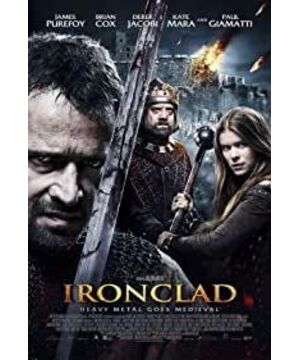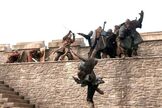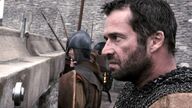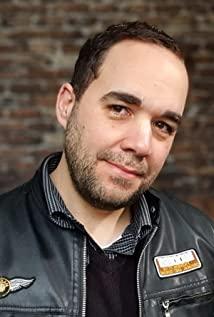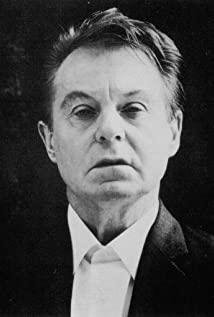himself mentioned in a previous article that the different results of the "Chinese riots" and the Magna Carta are largely due to the geographical environment. The topic is very large, and I may not be able to grasp it in the next. Try to write an article, purely to inspire criticism and corrections.
When William I, Duke of Normandy, conquered England, he encountered a problem: how to hold these two places (Normandy and England) )? This was not obvious when he was alive, but after William died, the war with the King of France was ignited. By the time of "Landless King" John, his territory in Normandy had been lost. In order to regain Normandy, John began to increase Taxes resulted in a noble rebellion, and John was forced to sign the Magna Carta in 1215.
In addition to the King of England, 25 people signed the Magna Carta. These include: the Archbishop of Canterbury, the Archbishop of England and the Cardinal Stephen of the Church of St. Rome, the Archbishop of Dublin Henry, the Bishop of London William and Winchester. Winchester Bishop Peter (Peter), Bath (Bath) and Glastonbury Bishop Jocelyn (Jocelyn), Lincoln (Lincoln) Bishop Hugh (Hugh), Worcester (Worcester) Bishop Walter (Walter), Kao Bishop William of Coventry, Bishop Benedict of Rochester, Ambassador Pandelf (Pandulf), the fifth official of the family of my bishop, Ambassador Aymeric, chairman of the Templars of England, and outstanding people For example, William Marshal, Earl of Pembroke, William Marshal, Earl of Salisbury, William Earl of Warenne, William, Earl of Arundel, Galleway [Galloway] Alan [Alan] (Marshal of Scotland), Fitz Gerald Warren [Warren Fitz Gerald], Fitz Herbert Peter [Peter Fitz Herbert], Deborah Hubert [Hubert de Burgh] ] (The head of the state of Poitou), Hugh de Neville, Hugh de Neville, Matthew Fitz Herbert, Thomas Basset, Basset Seth Alan (Alan Basset), Debney 1 Philip (Philip d'Aubigny), Robert of Roppesley (Robert of Roppesley), Marshall Johan (John Marshal), Fitzshoe Johan ( John Fitz Hugh, etc. and other of our followers (hehe, I tried to save trouble, copied it, and the English version is correct, that’s right).
The place names mentioned are: Canterbury (87km southeast of London, the same below), Dublin (the capital of Ireland), Winchester (95km southwest), Bath (156km west), Glasstein (185km west), Lincoln (195km north), Wuster (165km northwest), Coventry (139km northwest), Pembroke (332km west), Salisbury (126km west southwest), Warren, Allen Valley (76km southwest ), Galleway (near London). In terms of distribution, all the nobles in the south and central England participated, as far as Dublin, Lincoln, and Pembroke. It can be said that all the nobles across the UK are involved. So when John reopened the war in 1216 in order to abolish the contract, he relied on foreign mercenaries only, and the results of the war could be imagined.
All the nobles in England can participate in the war, which is closely related to its geography: the whole of England is 400km long from east to west and 500km long from north to south. Based on a daily march of 20km, they can reach London within 15 days from any place. The formation of a coalition of nobles is not a problem.
For Britain: The signing of the Magna Carta is a national event.
I have briefly described the "national riots" above, and it does not make much sense to go into the truth (in this case, it is meaningless to discuss whether the king is the king or the republic of Zhouzhao). Among the people mentioned are: Gong Bohe, Zhougong and Zhaogong. Without mentioning the distant princes (Lucai, Caowei, Qijin, etc.), it can basically be considered that the nobles in Wangji rebelled, and the result also weakened the royal power. This kind of weakening of the royal power is fatal: when the king was proclaimed, after the defeat of the king in the battle of a thousand acres, the king was no longer a decisive force.
Why didn't Qilu and other princes hear about it? We can look at the straight-line distance between their capital city and Ho Kyung: Lu (900km), Qi (1000km), Cai Caowei (about 500km). It is estimated that it will take two months to walk from Qi Di to Ho Kyung.
Therefore, the "national riots" are only a partial incident and have little to do with the princes.
Zhou was a very special dynasty: Xiao Bang Zhou was able to destroy the Great Bang Yin, to a large extent it was an accident. In order to control remote places, Zong Zhou adopted the policy of enforcing princes. After the princes were sealed, Zhou Tianzi's power was greatly weakened. The princes in the distance are in their own affairs and do not listen to orders (such as Lu Qi's conquest). Under this circumstance, there is nothing wrong with the direction of King Li's policy of enriching the country and strengthening the army. And the result of the "national riots" was the disintegration of Zong Zhou, and the princes sat in power.
In the Zhou Dynasty, the emperor’s grants were everywhere, but seizures were rare. The princes and Shiqing attacked each other (such as Luan’s attack on the public house, Han Zhao, Wei Miezhi, and the son’s abandonment of disease to seize the throne). Royal family. This situation continued until the end of the Warring States Period. At the beginning of Qin Dynasty, when discussing whether the system of prefectures and counties or the system of enfeoffment, although Li Si alone insisted on the system of prefectures and counties, Emperor Shi still adopted it. Zhou's lesson cannot but be said to be a major factor. Qin's ability to unify the six countries was largely due to the system of prefectures and counties.
The shortcomings of the county system were not obvious at the time. The ancients were not prophets, how could they know? Is blindly blaming the ancients for being too harsh?
View more about Ironclad reviews


